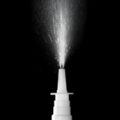
Although ragweed pollen is prevalent over the summer, many allergy sufferers don't start experiencing symptoms until fall rolls around. According to Illinois news outlet WGEM.com, this is because people are more likely to keep their windows open once the weather cools down a bit and air conditioning is no longer necessary. When you let fresh air into your house, it's important to remember that you're also allowing allergens to make their way inside.
In an interview with the source, Dr. Gary Carpenter, an allergist with Quincy Medical Group, said that people need to be careful that their allergy symptoms don't interfere with their sleeping patterns.
"It deprives you of good quality sleep either because it induces sleep apnea, which is snoring and actually not getting oxygen when you sleep," explained Carpenter. "Then, you wake up feeling really tired and you wake up with headaches because your brain has literally been deprived of oxygen."
Fortunately, there are a few ways you can ensure that you sleep well at night in spite of your allergies. Carpenter recommends showering and changing your clothes as soon as you get home at the end of the day to rid your skin of any irritants that you may have picked up while outdoors. You can also invest in allergenic bedding, which is carefully crafted to prevent allergens from bothering you while you sleep.
Ragweed allergies are expected to be in full effect until November or December, so peruse the Allergy Be Gone website today to find out more about which allergy products are best for you.









